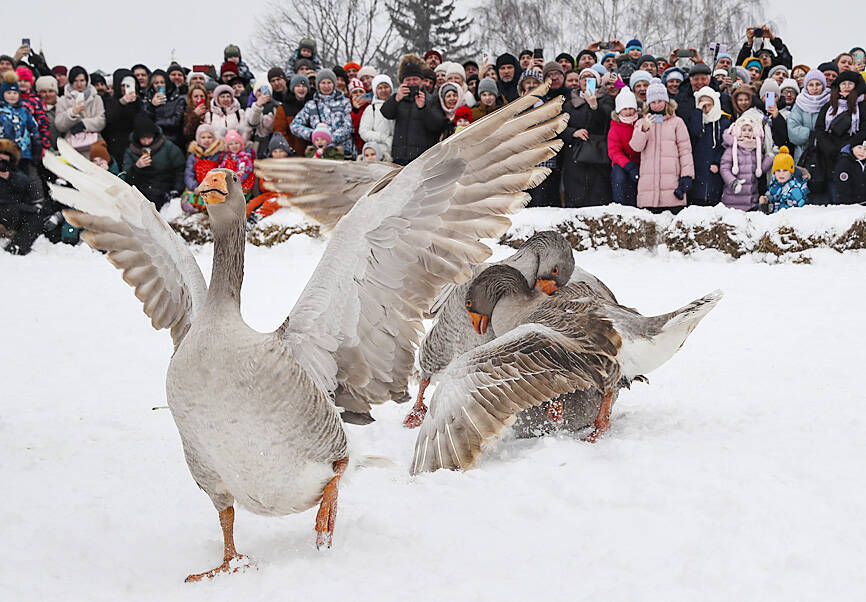The pink-footed goose has become a bold explorer in what appears to be a remarkable example of an arctic species not only adapting, but thriving, in the face of climate change.
In the 1990s, small numbers of the silvery brown bird with flashy pink legs began popping up in Sweden and Finland, far from their traditional migration route and breeding grounds in Norway. The sightings became more frequent in the 2000s before exploding in the 2010s.
“All of a sudden, these few hundred birds developed into thousands,” said Jesper Madsen, a biology professor at Aarhus University in Denmark and lead author of a new paper in the journal Current Biology.

Photo: EPA-EFE
In 2018 and 2019, researchers attached solar-powered GPS transmitters to 21 of the intrepid geese and began tracking their migration through Scandinavia. They were amazed to discover that some of the birds were headed for an entirely new breeding ground on Russia’s Novaya Zemlya archipelago, almost 1,000km from their traditional grounds in Svalbard, Norway.
Global warming has made conditions at the new site similar to those at Svalbard about 40 years ago, Madsen said, which suggests the geese have been responding to climate change and its consequences, including changes to plant life in Norway and increased competition with other species of geese.
Researchers speculate that some of the early explorers might have followed taiga bean geese, another northern species, along their migration path to new wintering spots.
However, the sheer number of pink-footed geese now established in Russia — the population has grown from 100 to 4,000 — and the distance they must travel to get there suggests they are also absorbing information from their explorer relatives in a process called social learning.
“We see that the birds reproduce well, and survive well, but that cannot explain the rapid growth,” Madsen said.
It is more likely that information is being shared between the birds, causing more and more to join the new colony, he said.
The discovery could offer some hope for other arctic species that are under increasing stress. Wildlife are seen as particularly vulnerable to climate change in the region, where accelerating warming is causing temperatures to rise at about four times the global rate.
“The geese have a behavioral trait that gives them an advantage,” Madsen said, which raises the question of whether other animals can adapt to climate change through social learning.
“It could also be beneficial to other species in the arctic like reindeer, wolves and whales, where you have social interactions and social communication,” he said.

Former Nicaraguan president Violeta Chamorro, who brought peace to Nicaragua after years of war and was the first woman elected president in the Americas, died on Saturday at the age of 95, her family said. Chamorro, who ruled the poor Central American country from 1990 to 1997, “died in peace, surrounded by the affection and love of her children,” said a statement issued by her four children. As president, Chamorro ended a civil war that had raged for much of the 1980s as US-backed rebels known as the “Contras” fought the leftist Sandinista government. That conflict made Nicaragua one of

COMPETITION: The US and Russia make up about 90 percent of the world stockpile and are adding new versions, while China’s nuclear force is steadily rising, SIPRI said Most of the world’s nuclear-armed states continued to modernize their arsenals last year, setting the stage for a new nuclear arms race, the Stockholm International Peace Research Institute (SIPRI) said yesterday. Nuclear powers including the US and Russia — which account for about 90 percent of the world’s stockpile — had spent time last year “upgrading existing weapons and adding newer versions,” researchers said. Since the end of the Cold War, old warheads have generally been dismantled quicker than new ones have been deployed, resulting in a decrease in the overall number of warheads. However, SIPRI said that the trend was likely

BOMBARDMENT: Moscow sent more than 440 drones and 32 missiles, Volodymyr Zelenskiy said, in ‘one of the most terrifying strikes’ on the capital in recent months A nighttime Russian missile and drone bombardment of Ukraine killed at least 15 people and injured 116 while they slept in their homes, local officials said yesterday, with the main barrage centering on the capital, Kyiv. Kyiv City Military Administration head Tymur Tkachenko said 14 people were killed and 99 were injured as explosions echoed across the city for hours during the night. The bombardment demolished a nine-story residential building, destroying dozens of apartments. Emergency workers were at the scene to rescue people from under the rubble. Russia flung more than 440 drones and 32 missiles at Ukraine, Ukrainian President Volodymyr Zelenskiy

Indian Prime Minister Narendra Modi is to visit Canada next week, his first since relations plummeted after the assassination of a Canadian Sikh separatist in Vancouver, triggering diplomatic expulsions and hitting trade. Analysts hope it is a step toward repairing ties that soured in 2023, after then-Canadian prime minister Justin Trudeau pointed the finger at New Delhi’s involvement in murdering Hardeep Singh Nijjar, claims India furiously denied. An invitation extended by new Canadian Prime Minister Mark Carney to Modi to attend the G7 leaders summit in Canada offers a chance to “reset” relations, former Indian diplomat Harsh Vardhan Shringla said. “This is a